|
|
|
Sort Order |
|
|
|
Items / Page
|
|
|
|
|
|
|
| Srl | Item |
| 1 |
ID:
141312


|
|
|
|
|
| Summary/Abstract |
Since 2012, the Deportation Research Clinic, part of the Buffett Institute for Global Studies at Northwestern University, has been pursuing research on government misconduct under the rubric of what Jacqueline Stevens calls “forensic intelligence.” The Clinic uses law and publicity, including scholarship, to create new realities, which in turn produce new facts and knowledge. Stevens draws on scholarship by S.M. Amadae, Noam Chomsky, Philip Green, Chalmers Johnson, Kenneth Osgood, Ido Oren, Michael Rogin, and Frances Saunders to explain the relation of “forensic intelligence” to the “national intelligence” paradigm now organizing mainstream political science research. The article concludes by describing how U.S. government and economic elites distort research and teaching priorities, and provides examples from Northwestern University.
|
|
|
|
|
|
|
|
|
|
|
|
|
|
|
|
| 2 |
ID:
133909
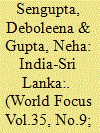

|
|
|
|
|
| Publication |
2014.
|
| Summary/Abstract |
India and Sri Lanka, the two very close neighbours, are separated by a narrow stretch of water called Palk Strait. The history and mythology of the two countries are inter- related and the social ties between the two is more than 2,500 years old and both sides have built upon a legacy of intellectual, cultural, religious and linguistic intercourse. Shortly following independence, the major tribulations bedevilling the rapport of both the countries were the question of citizenship of the persons of Indian Origin resident in Sri Lanka, the majority of who had migrated to the Island during the British Period to the Coffee and subsequently tea plantations.
|
|
|
|
|
|
|
|
|
|
|
|
|
|
|
|
| 3 |
ID:
133905
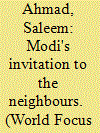

|
|
|
|
|
| Publication |
2014.
|
| Summary/Abstract |
"A resurgent India must get its rightful place in the comity of nations and international institutions. The vision is to fundamentally reboot and reorient the foreign policy goals, content and process, in a manner that locates India's global strategic engagement in a new paradigm and on a wider canvass, that is not just limited to political diplomacy, but also includes our economic, scientific, cultural, political and security interests, both regional and global, on the principles of equality and mutuality, so that it leads to an economically stronger India, and its voice is heard in the international fora.
|
|
|
|
|
|
|
|
|
|
|
|
|
|
|
|
| 4 |
ID:
088672


|
|
|
|
|
| Publication |
2009.
|
| Summary/Abstract |
The 1846-48 conflict between the US and Mexico was the first US war in which military victory over the foe's conventional army and successful resistance to Pakistan attacks failed to produce the desired political outcome.
|
|
|
|
|
|
|
|
|
|
|
|
|
|
|
|
| 5 |
ID:
138049
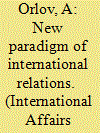

|
|
|
|
|
| Summary/Abstract |
The twenty-five-year-long partnership between Russia and the West (never easy and never straightforward), which began back in the last years of Soviet perestroika, has ended. It will be probably replaced with a new structure of international cooperation much more pragmatic and devoid of illusions and exaggerated expectations nurtured by Russia rather than the West. It is wrong to expect that when the situation in Ukraine has been stabilized (it will be stabilized sooner or later) the world (or at least the part which stretches from Vladivostok in the east to Vancouver in the west) will go back to its pre-crisis state. There is no way back. The old bridges were burned while new bridges have not yet been built. The paradigm of world development geared at the prospects of long-term partnership (which, for a long time, had looked the only option) was destroyed.
|
|
|
|
|
|
|
|
|
|
|
|
|
|
|
|
| 6 |
ID:
143800
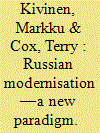

|
|
|
|
|
| Summary/Abstract |
By the time of the collapse of the Soviet system in 1991 it had become increasingly accepted that the modernisation of society effected by Soviet communism had reached its inherent limits and, in particular, that the increased complexity of an industrialised society had exhausted the capacities for change of the centrally managed ‘planned’ economy and the rule of a single party claiming superior scientific knowledge of the management of society. The flexibility of a market economy and the possibility of choice between potential rulers seemed to offer a more appropriate institutional basis for the increased complexity of contemporary society and the relations between societies to be found in an increasingly globalised world.
|
|
|
|
|
|
|
|
|
|
|
|
|
|
|
|
| 7 |
ID:
156772
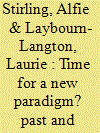

|
|
|
|
|
| Summary/Abstract |
This article seeks to place the UK's present economic ‘moment’ in historical context. Over the course of the decade since the 2007 financial crisis, it has increasingly been acknowledged that a cyclical crisis has become a structural crisis. The failure of most economists to predict the financial crash in the first place, and the inadequacy of economic policy in responding to its lasting effects, has led many to conclude that economics itself is in crisis. This article seeks to contribute to a better understanding of the present period of disjuncture. Drawing on theories of paradigm shift from both the physical and social sciences, we argue that the speed of change in UK economic policy is comparable to the two major historical transitions that ended with the post-war consensus and neoliberalism. We conclude by offering some remarks on how and where the present change might take us.
|
|
|
|
|
|
|
|
|
|
|
|
|
|
|
|
| 8 |
ID:
126684
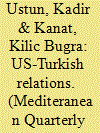

|
|
|
|
|
| Publication |
2013.
|
| Summary/Abstract |
US-Turkish relations are in the best shape of recent memory. President Barack Obama's first official overseas visit (in 2009) was meant to start a new type of relationship with Turkey, dubbed the "model partnership," but the bilateral relations received particular attention in the wake of two major diplomatic crises in 2010: a flotilla incident-when the ship the Mavi Marmara, owned by a Turkish nonprofit organization, was boarded by the Israeli military while on the way to Gaza with aid-and Turkey's "no" vote at the UN Security Council on sanctions against Iran. Both of these crises had to do with regional issues of vital importance for both the United States and Turkey. The Arab Spring that began in late 2010, however, created a new dynamic that rendered cooperation between the two countries critical.
|
|
|
|
|
|
|
|
|
|
|
|
|
|
|
|
|
|
|
|
|